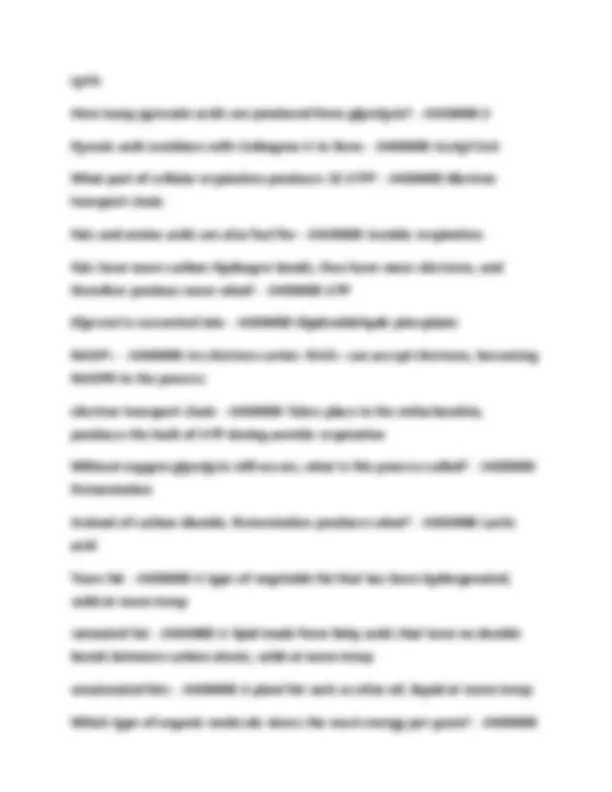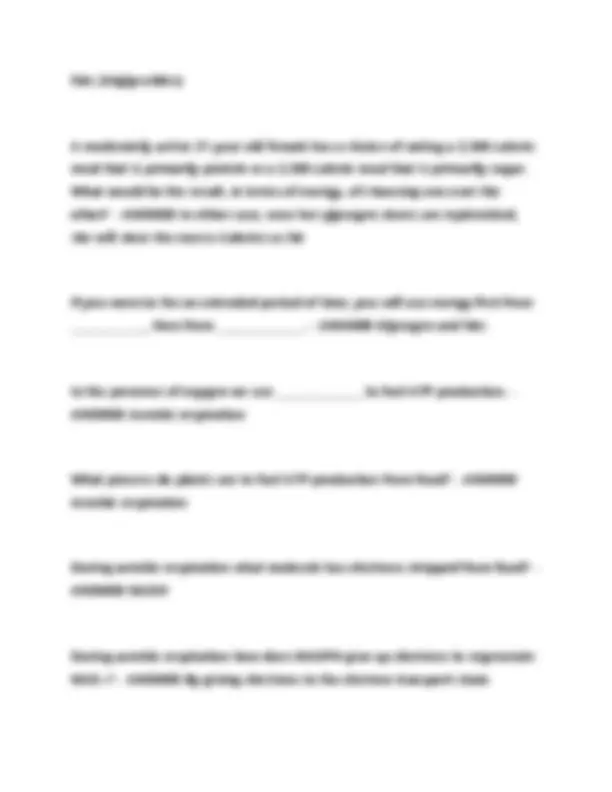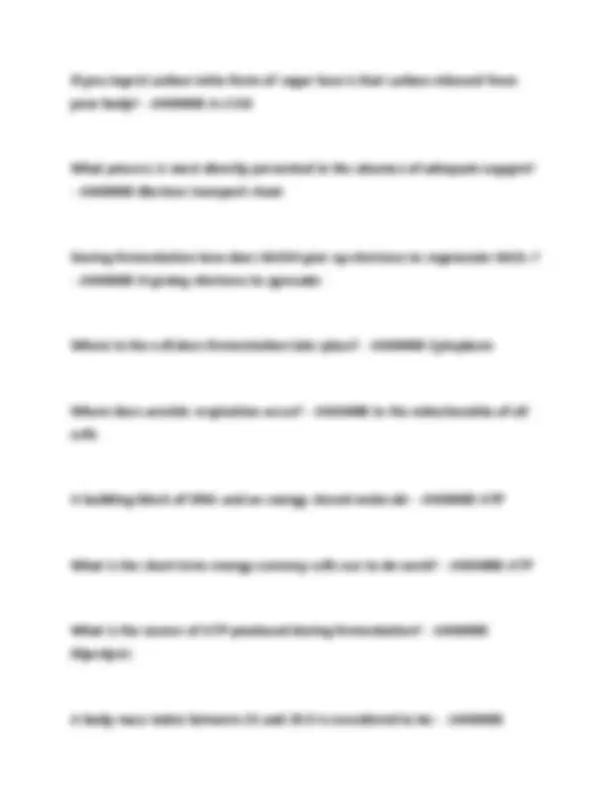





Study with the several resources on Docsity

Earn points by helping other students or get them with a premium plan


Prepare for your exams
Study with the several resources on Docsity

Earn points to download
Earn points by helping other students or get them with a premium plan
Community
Ask the community for help and clear up your study doubts
Discover the best universities in your country according to Docsity users
Free resources
Download our free guides on studying techniques, anxiety management strategies, and thesis advice from Docsity tutors
A comprehensive q&a format covering key concepts in cellular respiration and energy metabolism. it explores topics such as aerobic and anaerobic respiration, the roles of glucose, atp, and other molecules, and the processes of glycolysis, the krebs cycle, and the electron transport chain. The questions and answers are detailed and insightful, making it a valuable resource for students studying biology or related fields.
Typology: Exams
1 / 6

This page cannot be seen from the preview
Don't miss anything!




Energy in food is the - ANSWER Chemical bond
What is BMI? - ANSWER An estimate of body fat based on height and weight
Overweight BMI - ANSWER 25-29.
Obese - ANSWER 20% more fat than recommended for ones height
calorie - ANSWER the amount of energy needed to raise the temperature of 1 gram of water 1 degree Celsius
Calorie - ANSWER 1,000 calories or 1 kilocalorie (kcal)
Scientists measure food energy in units called - ANSWER Calories
Energy in food comes originally from - ANSWER The sun
Glycogen - ANSWER A complex animal carbohydrate made up of linked chains of glucose molecules
Glycogen is used in our body as - ANSWER Short-term energy storage
What happens when we invest more calories than our bodies need? - ANSWER They are stored as glycogen in muscle and liver cells
Once the body's glycogen stores have been replenished, any excess calories are stored as - ANSWER Triglyceride molecules in the fat cells
Triglycerides - ANSWER A type if lipid found in fat cells that are used for long-term energy storage
Triglycerides store approximately _____ Calories per gram - ANSWER 9
The energy in food must be converted into ______ before it can be used by the cell - ANSWER ATP
aerobic respiration - ANSWER Respiration that requires oxygen
What happens during aerobic respiration? - ANSWER Our cells use the oxygen we inhale to help extract energy from food, cells convert the energy in food molecules into the bonds of ATP, the cells energy currency.
What are the inputs of aerobic respiration? - ANSWER Glucose and oxygen
What are the outputs of aerobic respiration? - ANSWER ATP, carbon dioxide, and water
1 molecule of glucose equals how many molecules of ATP? - ANSWER 36
cellular respiration - ANSWER The process by which cells use oxygen to produce energy from food
What are the three stages of cellular respiration? - ANSWER Glycosides, Krebs cycle, and electron transport chain)
Where does glycolysis take place? - ANSWER Cytosol
Breaking glucose into 2 smaller molecules - ANSWER Glycolysis
Where does the Krebs cycle (citric acid cycle) take place? - ANSWER Mitochondria
Where does the electron transport chain take place? - ANSWER Mitochondria
What happens in the Krebs cycle? - ANSWER Pyruvate goes through the citric acid cycle and you get ADP
Pyruvate oxidation occurs after glycolysis but before the - ANSWER Krebs
Fats (triglycerides)
A moderately active 21-year old female has a choice of eating a 2,500 calorie meal that is primarily protein or a 2,500 calorie meal that is primarily sugar. What would be the result, in terms of energy, of choosing one over the other? - ANSWER In either case, once her glycogen stores are replenished, she will store the excess Calories as fat
If you exercise for an extended period of time, you will use energy first from ______________, then from ________________. - ANSWER Glycogen and fats
In the presence of oxygen we use ________________ to fuel ATP production. - ANSWER Aerobic respiration
What process do plants use to fuel ATP production from food? - ANSWER Aerobic respiration
During aerobic respiration what molecule has electrons stripped from food? - ANSWER NADH
During aerobic respiration how does NADPH give up electrons to regenerate NAD+? - ANSWER By giving electrons to the electron transport chain
If you ingest carbon inthe form of sugar how is that carbon released from your body? - ANSWER As CO
What process is most directly prevented in the absence of adequate oxygen?
During fermentation how does NADH give up electrons to regenerate NAD+?
Where in the cell does fermentation take place? - ANSWER Cytoplasm
Where does aerobic respiration occur? - ANSWER In the mitochondria of all cells
A building block of DNA and an energy stored molecule - ANSWER ATP
What is the short term energy currency cells use to do work? - ANSWER ATP
What is the source of ATP produced during fermentation? - ANSWER Glycolysis
A body mass index between 25 and 29.9 is considered to be: - ANSWER